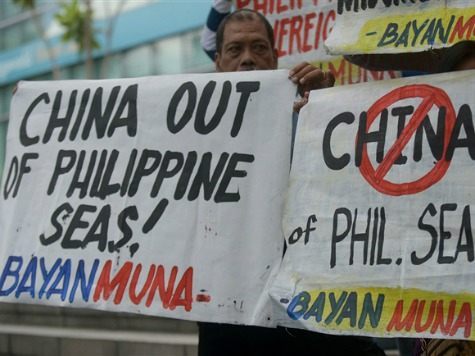The Foreign Affairs Secretary of the Philippines has confirmed that the nation will not engage in bilateral talks with China over the South China Sea under the terms Beijing has dictated, which requires Filipino diplomats to not mention the existence of a verdict in their favor issued by the Permanent Court of Arbitration at the Hague.
The Philippines won the international legal case last week, in which the Hague concluded that China’s “nine-dash line” — a border usurping territory belong to the Philippines, Vietnam, Taiwan, Brunei, Malaysia, and Indonesia — has no basis in international law and the nation should cease its “reclamation” efforts in the region immediately. While Philippine officials have repeatedly expressed a willingness to engage in talks with China, the demand that neither side the Hague case at all is a dealbreaker, Foreign Affairs Secretary Perfecto Yasay asserted.
“They had asked us also to open ourselves for bilateral negotiations but outside of and in disregard of the arbitration ruling. I told him that this is something that was not consistent with our constitution and our national interest,” Yasay told Philippine broadcaster ANC, referring to a talk with Chinese Foreign Minister Wang Yi. Following Yasay’s refusal, he says Wang warned that “confrontation” could be in the future, though he did not specify whether that involved military retaliation.
Yasay argued the Hague ruling conclusively ended the debate over which territories in the South China Sea do not belong to China. “The tribunal have really debunked in no unmistakable terms the position of China in so far as the nine-dash line is concerned,” he said.
The conversation between Yasay and Wang is the highest level discussion of its nature between the two governments. Philippine president Rodrigo Duterte and his Chinese counterpart Xi Jinping have not spoken since the Hague ruling.
The Philippine Star reports that Duterte told American Congressmen in Manila that he has “no plans” to negotiate with China at all over the territories in dispute. Yasay emphasized that Duterte’s main priority is currently the return of Philippine fishermen to the Scarborough Shoal, a territory in international waters that China has usurped as a military asset. Duterte had previously referred to the shoal as a “little” issue that did not merit military action.
Duterte has repeatedly asserted that he is against taking military action to protect Philippine territories from China. As a presidential candidate, he said he would personally reclaim the disputed territories while riding on a jet ski before he would deploy the military to attack China. “We are not prepared to go to war. War is a dirty word,” he said shortly before the Hague verdict. “If [the verdict] is favorable to us, let’s talk.”
The Chinese government has repeatedly blamed Japan and the United States for the Hague verdict and explicitly refused to attack Duterte, noting that the case was filed before he assumed power and that his conciliatory tone was welcomed by Beijing. “The door to settling the issue through dialogue and negotiation has never been closed,” foreign ministry spokesperson Lu Kang reiterated last week. “It is China’s hope that the two countries will return to the consensus of settling related issue through dialogue and consultation, and work together to improve bilateral relations.”
Chinese state media is also pushing for dialogue with the Philippines, though only on the terms Wang dictated, which would require the Philippines to give up a high-profile victory on the international stage. “Joint developments are very broad, including resources, fisheries, maritime rescue, meteorologic data exchange as well as disaster relief at sea. We should move step by step,” state news outlet Xinhua quotes Zhao Qizheng, dean of the school of journalism at the Renmin University of China, as saying. China’s vice minister of commerce Gao Yan has also asserted that public protests calling for boycotts of Philippine products are not a reflexion of the attitudes of Chinese officials. “I should say that though some Internet users have called for boycotts on products from the Philippines, in actuality this situation has not occurred,” he asserted.

COMMENTS
Please let us know if you're having issues with commenting.